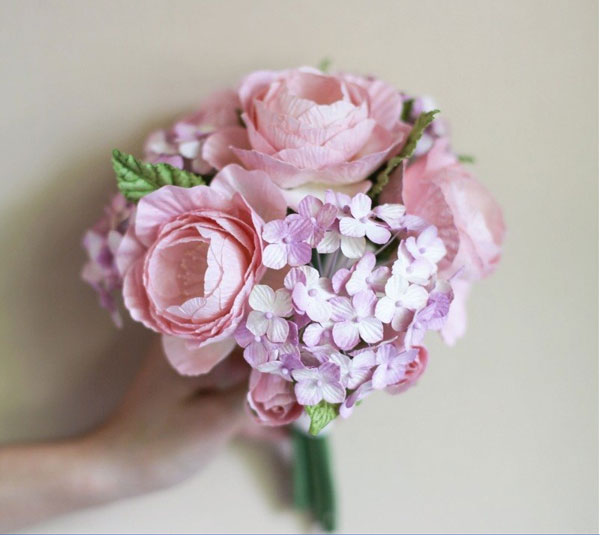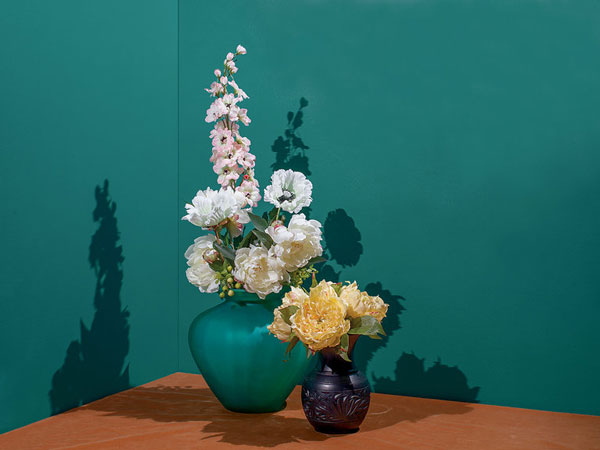当前位置: Language Tips> 英语学习专栏
爱是送一把纸玫瑰?相比短暂的绚烂之后就枯萎凋零的鲜花,也许一捧鲜艳的人造花更能持久地留住爱。本文作者就是一位人造花粉丝,因为在她看来,将鲜花从故土“绑架”到异地销售的行为会让鲜花失色又失神,而一束精心制作的人造花则浓缩了制作人满满的爱。

By Avi Steinberg
黄雪芹 译注
When I profess my affection for fake flowers, I often feel as though I’m confessing a character flaw. They have, to say the least, a bad reputation. As decoration, they are considered tacky; as gifts, tactless. They are widely regarded as creepy and depressing—the association is with the debauched fakeries you’ll find on the lapels of birthday-party clowns and the sad sacks of nylon collecting dust in the waiting rooms of our laziest dentists.
每当我公开承认自己喜欢人造花的时候,都感觉像在承认自己的性格缺陷。因为至少人造花的名声不好。拿它们当装饰品吧,俗气;送礼吧,不体面。人们普遍觉得人造花让人感觉诡异且压抑。它们身上那种堕落的虚假,让人不禁联想到生日聚会上小丑衣服的翻领,或者懒惰牙医的候诊室里让人忧伤的尼龙垃圾袋。
I understand why people prefer fresh flowers—we imagine they’re individuals like us, delicate, one of a kind and all the more precious for the fact that their time on earth is limited. But real flowers aren’t quite as rare as they seem, nor quite as personal as we’d like them to be. Their authenticity —the essence of their appeal—is often illusory.
我理解人们为何更喜欢鲜花——我们的想象力赋予鲜花生命,它们娇嫩又独特,并因其有限的生命而显得弥足珍贵。其实鲜花并非表面上看起来的那么珍稀,也没有我们想的那么独特。它们的真实性——其吸引力的精华所在——常常是虚无缥缈的。

I’ve been having this debate for years with my mother, a hard-liner on the question of soil-grown flowers versus simulacra. Once, when I praised some handmades at a store, she told me that she found my worldview joyless and bleak. “That’s not how I raised you,” she said, and walked away as though she couldn’t even bear to see me standing next to them. Later, she summarized her position: “Why don’t you just put fake lettuce in your salad? I’m sure your dinner guests will appreciate it.” I have stopped trying to argue with her, and instead I’ve turned to sleazy methods of persuasion: I recently sent her a photo of some silk peonies and lured her into praising them before revealing their dark secret.
就这个问题,我和我妈争论了好多年。她是土壤种植鲜花的铁杆粉丝,坚决反对人造花。有一次我称赞商店里的人造花,她却说她发现我的世界观黯淡无趣。“我从未这么教育你呀,”她说完立即从我身边走开,仿佛无法容忍看到我和这些人造花站在一起。事后,她这样总结自己的立场:“你怎么不在沙拉里放假生菜呢?我相信你的客人会喜欢的。”我不再试图和她争论,而是采用更“卑劣”的方法软化她:最近我寄给她一张丝绸牡丹的照片,并诱导她称赞照片里的花,而不事先揭秘这些其实是人造花。
Regardless of what my mother says, I don’t believe that organic authenticity is really what we prize most in a flower. Take the Rafflesia arnoldii : It may grow in the wild, just as God intended, but it looks like a scary open wound and smells like a decaying rat. The artificial flower, on the other hand, may not have originated in the field, but it has long found a stately perch. Imitations were once prized by nobles, from the palaces of imperial China to Versailles, where Louis XIV’s courtiers are believed to have sought silken blossoms for the tops of their bed canopies. From these royal lineages to the more democratic-spirited creations of today’s artisans, handmade blossoms remain a proud tradition.
不管我妈怎么说,我并不认为人们评判一朵花的珍贵时真的要首先取决于它的有机真实性。以阿诺德大王花为例:它如上帝希望的那样,生长在野外,但它看起来就像一个敞开的伤口,散发出一股腐烂的老鼠味。相较之下,人造花虽非来自大自然,但它早已觅得高贵的居所。从中国的皇宫到凡尔赛宫,人造花曾一度为贵族阶层所青睐。据说法国国王路易十四的侍臣曾四处寻求丝绸花来装饰皇室的床盖。从皇家饰品到现代工匠更为大众化的创意制作,人造花一直是值得骄傲的传统。
Maybe there’s a good reason so many people buy Eco Flowers. Maybe people are seeing beyond the supposed authenticity of an orchid, kidnapped from its true home, so that you can impulse-buy it at Ikea, only to watch it “bloom” on your dinner table in the dead of a New England winter. The people who ship soil-grown flowers from across the globe—which are the bulk of a roughly $31 billion floral industry—are the ones selling a falsehood; what authentic connection to nature could possibly arise from such a convoluted arrangement? And how sad that a flower, so alienated from its true home, is supposed to communicate feelings of genuine connection.
或许有理由解释为何这么多人都爱买Eco Flower的环保花。或许人们看到,一朵兰花所谓的真实背后,是它从生长地被“绑架”出来,于是你才能在宜家一时兴起买下它,只为了看着它在新英格兰隆冬时节“盛开”在你的餐桌上。将土壤种植的花儿运往全球的商人——这一环节在价值约310亿美元的鲜花产业中占大幅比例——其实是在贩卖虚假,因为经过这般周折,这些花儿还能保留多少可信的自然元素呢?而要求一朵远离故土的花带给人们与自然的联结感又是多么令人伤心的事。
Handcrafted flowers, by contrast, make no pretenses. They are the sincerest of flowers, precisely because they are made—with intention, craft, ingenuity and quirky imperfection. Born in the heart and shaped by the singular hand of the gift giver, these artful flowers are the ones that most resemble love itself.
相比之下,人造花就免去了那份矫揉造作。它们才是最真诚的花,因为它们是用心、工艺、创意又带点儿奇特的不完美的结晶。人造花是送礼人用心制作的手工作品,所以它们才最能代表爱。
Vocabulary
1. tacky: 俗气的,劣质的;tactless: (说话或行为)不圆通的,不明智的。
2. debauched: 堕落的,道德败坏的;lapel: 翻领。
3. authenticity: 真实性。
4. hard-liner: 不妥协者,强硬派;simulacra: 模拟物。
5. sleazy: 低劣的,低级庸俗的。
6. Rafflesia arnoldii: 阿诺德大王花,是世界上最大的花,以英国植物学家约瑟夫•阿诺德的姓氏命名。
7. stately: 庄重的,高贵的;perch: 栖息地。
8. Versailles: 凡尔赛宫,位于巴黎西南郊,1682—1789年间曾是法国的王宫及政治中心,1979年被列入《世界文化遗产名录》;Louis XIV: 路易十四(1638—1715),自号太阳王,是波旁王朝的法国国王和纳瓦拉国王,也是欧洲历史上在位时间(1643—1715)最长的君主;courtier: 朝臣,侍臣;canopy: (床、座位等上的)顶罩,华盖。
9. lineage: 血统,世系。
10. Eco Flower: 一家环保花束公司,创办于2014年,总部位于美国犹他州,使用的材料都是可再生或循环使用的,如木头、粗斜棉布、粗麻布、纸张等。
11. impulse-buy: 即兴购买;in the dead of winter: 在隆冬时节。
12. bulk: (商品的销售或运输)大量的,大批的。
13. convoluted: 错综复杂的。
14. ingenuity: 心灵手巧,善于创新;quirky: 奇特的,古怪的。
15. singular: 非凡的,突出的。
(来源:英语学习杂志 编辑:董静)
上一篇 : 备受争议的“便当史”
下一篇 :
关注和订阅

电话:8610-84883645
传真:8610-84883500
Email: languagetips@chinadaily.com.cn